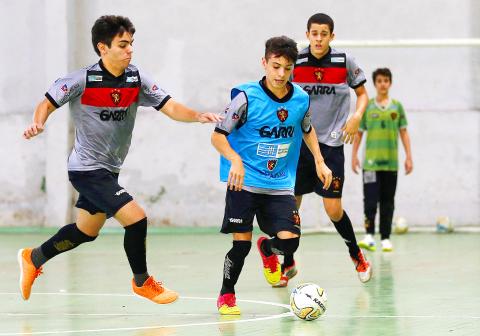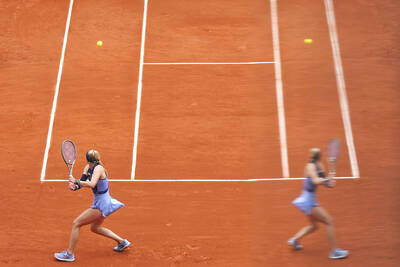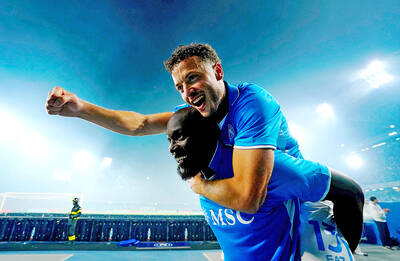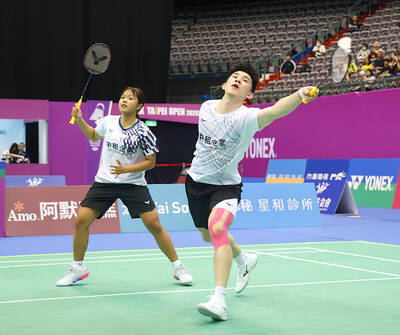The moment play breaks down, the counterattack begins, the players sweeping forward at a dizzying pace. The ball is fizzed out to the left, but the resulting shot thumps into the wall behind the goal. Brazil’s next generation are honing their skills.
Despite the warm winter weather in the city of Recife on Brazil’s northeastern coast, these young players are not outdoors playing in the sunshine with their friends. Instead, they are indoors playing futsal.
Played with a goalkeeper and four outfield players on tight pitches bordered by lines, this version of soccer has yet to really make a breakthrough in Europe, but it has long been an essential element of Brazil’s soccer success.

Photo: Reuters
That fact was evident in Brazil’s opening game of this World Cup, when Oscar’s lightning toe-poked finish bounced past the despairing dive of Croatia goalkeeper Stipe Pletikosa to put Brail 3-1 ahead.
“It was like something you might do in futsal,” the midfielder told reporters. “A lot of the squad started out playing futsal. When you get the chance, you shoot.”
There is no shortage of powerful shooting at Sport Club do Recife, where the club’s under-16 side is getting ready to defend the national title it won last year at under-15 level.
However, there is also plenty of dribbling and fast, accurate passing as they seek to work the ball forward and create an opening. Many of the players, drenched in sweat from their early-morning exertions, dream of one day emulating Oscar and playing for Brazil.
“Brazilian players with a more refined touch have played futsal initially, like Neymar,” said Gabriel Maia, a tall teenager with a silky touch and explosive pace.
Maia finds his futsal skills to be a great help when he plays the 11-a-side game more familiar to World Cup watchers, and plays futsal with the team as a way of expanding and completing his education.
QUICK THINKING
“Futsal requires very quick thinking from the player, so he learns at a young age,” he says. “When you go to the regular pitch, even with a very high tempo, he has a good pass, good control, so it helps with strategy of the game.”
Amid the squeak of sneakers on the floor where his team are playing, Maia’s teammate Guilherme Henrique explains the difference between futsal and regular soccer.
“The ball in futsal is smaller and heavier than a regular football. When controlling the ball, because it’s done on a flat surface with more friction, we tend to step on the ball, while in regular football we control the ball with the side of the foot,” he said. “So in futsal, you can have more stability with the ball, you can roll the ball and make faster moves with it.”
The practice game bears out his claim, as players kill the ball with the sole of the foot before quickly turning and accelerating away.
Short chipped passes that would run out of play on grass outdoors drop dead on the floor and stay in, thanks to the weight of the ball.
The two teenagers would love careers as professional soccer players with big clubs in Europe, but they are aware that the popularity of futsal, in which Brazil has won five FIFA World Cups, means that they can make a living there too.
“It depends where you play. In the south or southeast of Brazil, you’re more valuable because that’s where the futsal league is,” says Maia, who is in awe of the game’s top earner, Alessandro Rosa Vieira, better known as Falcao, the “King of Futsal.”
The 37-year-old spent a brief spell in Brazilian soccer at Sao Paulo before returning to futsal, where his stunning array of flicks, tricks and dribbles have seen him showered with awards and titles.
VIABLE ALTERNATIVE
His success, and the high profile of the game in Brazil, means that a futsal career is a viable alternative for the two teenagers and their teammates.
“The majority of athletes prefer regular football,” Maia says. “We stay here to learn the way of thinking and all that, but even me, I prefer regular football. But in futsal, I know the doors are open, so I can kind of choose.”
Though the sport is growing in Europe, with Spain, Italy and Russia among the top international sides, it still has a long way to go before it will see the benefits in the way that Brazil already has.
Asked if European players could learn from playing the game, Maia is adamant.
“They could,” Maia says. “This could be a good way to improve football and open the doors to futsal, because futsal is more popular in Brazil. In the rest of the world, it’s not as much.”
His teammate Henrique believes that Europeans may not yet have the individual skills taught to Brazilians by futsal, but they are finally learning the tactical lessons of the game, although not necessarily by playing it.
“Lately, football in Spain, England, Germany, in Europe in general, has started to work with the lines on the field closer together,” he says, displaying a tactical acumen beyond his years. “The idea of that is to reduce the space the opponent has to play in. That’s the basic work of futsal.”

Carlos Alcaraz on Monday powered into the French Open second round with a resounding win to start his title defense, while world No. 1 Jannik Sinner and three-time defending women’s champion Iga Swiatek also progressed at Roland Garros. Four-time Grand Slam champion Alcaraz struck 31 winners in a 6-3, 6-4, 6-2 victory over Italian qualifier Giulio Zeppieri and is to face Hungary’s Fabian Marozsan in round two. Alcaraz is now on an eight-match winning streak at the French Open and also took Olympic silver at Roland Garros last year, losing the final to Novak Djokovic. “The first round is never

TIGHT FINISH: Napoli only needed to do the same as or better than Inter, who won their game against Como 2-0 on the same day, leaving Napoli with a one-point lead The two players who Antonio Conte wanted more than any others secured Napoli their second Serie A title in three years on Friday. Scott McTominay scored with an acrobatic bicycle kick before halftime and Romelu Lukaku doubled the lead with a solo goal after the break in the decisive 2-0 home win over Cagliari. Conte became the first coach to win the Italian championship with three different teams. “Everyone contributed to this — but the coach most of all,” Napoli captain Giovanni Di Lorenzo said. “Napoli needed him to get back on top. He’s phenomenal.” Comparing it to his three Serie A titles won

The journey of Taiwan’s badminton mixed doubles duo Ye Hong-wei and Nicole Chan at the Malaysia Masters in Kuala Lumpur came to an end in the semi-finals yesterday after they suffered a 2-0 loss to China’s Feng Yanzhe and Huang Dongping. Ye, 25, and Chan, 20, teamed up last year and are currently ranked No. 23 in the world. The Taiwanese shuttlers took on China’s second seeds in the mixed doubles event, but proved no match for Feng and Huang, losing the match 10-21, 7-21. In the first half of the first game, the pairings were neck and neck at 6-7 until Ye

SSC Napoli coach Antonio Conte has dragged the team back from disaster and restored them to the top of Italian Serie A, but his future at the Scudetto winners is in doubt even after a triumphant season. The fiery 55-year-old has exceeded preseason expectations and bolstered his reputation as a serial winner by guiding Napoli to their fourth Scudetto, and second in three seasons. However, he might well be on his way in the summer after just one season at the helm as his charged relationship with Napoli owner Aurelio De Laurentiis has simmered throughout the campaign. Conte has said